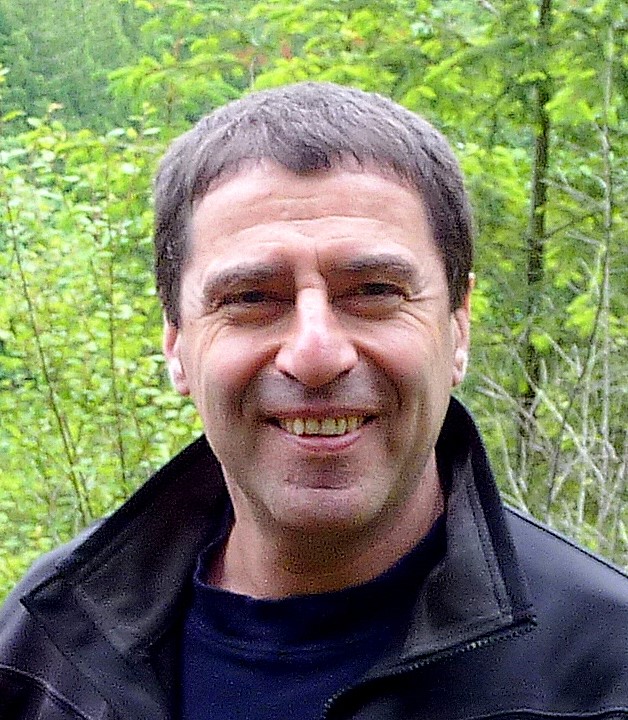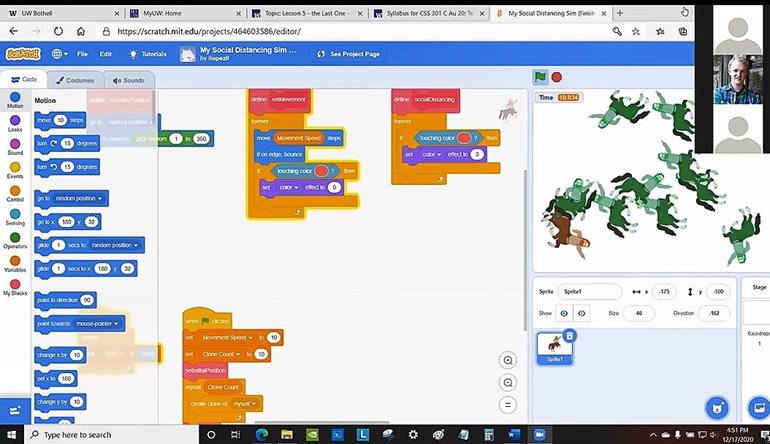
It’s a win-win that keeps on winning, said Arkady Retik, associate teaching professor in the School of STEM’s Division of Computing & Software Systems, of the K-12 Computing Education course he taught in autumn quarter.
“Students love this course,” he said. “Teaching and helping teens gives them a boost.”
The University of Washington Bothell students developed a coding curriculum and taught it to middle-school students in a free, after-school program at the YMCA of Greater Seattle.
Nicole Derr, the nonprofit’s director of education and curriculum, appreciated being able to partner on this educational opportunity even as the coronavirus pandemic made it impossible to teach the coding skills in person.
“The UW Bothell ability to shift the coding class to the Zoom setting worked well and gave us the opportunity to engage with the tween/teen ages in a meaningful way,” Derr said.
The UW Bothell course

Derr, who connects to UW Bothell through its Office of Community-Based Learning & Research, is excited the YMCA is able to offer another round of teen coding this winter with the help of the college students. “They are well-prepared, professional and communicative,” she said. “I have no hesitation in working with UW Bothell.”
Retik said the idea for having UW Bothell computer science students teach younger students in the local community originated with Professor Kelvin Sung. When Retik started teaching the course five years ago, it was once a year. Now the course is offered every quarter and has about 10 partnerships with the YMCA, local middle schools and other after-school programs.
The two-credit course fills up quickly, mainly with computer science students who recognize it will make them more confident in their communication and teamwork, said Retik, who teaches it twice a year, usually in autumn and spring. Assistant Teaching Professor Nancy Kool is teaching the course this winter with the YMCA program.
Class size is limited to about a dozen students. They form teams of two or three. After a few weeks of lectures, readings and discussions about teaching, they present a five- or six-week program to the younger students. One of the teams leads each week. They use visual programming freeware called Scratch. Users build programs by connecting blocks to create an animated story or computer game.
Students as teachers
The UW Bothell students welcomed the chance to help younger students and build professional skills.
- Carlos Nunez, a senior majoring in Applied Computing who wants to use an art background in game design, was attracted by the opportunity to try teaching.
“I don’t think I’m alone in going from a more visual field to something more logic based, and so I wanted to see if I could help teach programming concepts in a way that is easier for a noncoder (or a beginner) to understand,” said Nunez.
- Ellyssa Morgan is a senior majoring in Mathematics with minors in Computer Science & Software Engineering and in Informatics at the UW in Seattle. Morgan previously tutored high school students in Seattle and was excited to learn more about computer science education.
“I learned how to be more confident with students and how to be flexible with my lesson plan based on the students I was teaching and the environment,” said Morgan, who plans to pursue a master’s in computer science and wants to mentor K-12 students in computer science in the future.
- Margaret Connor, a senior majoring in Computer Science & Software Engineering, was attracted to the course by the opportunity to encourage young students to pursue science, technology, engineering and math.
“I thought this class would help me learn how I can help future software engineers, in the same way my curiosity was sparked as a child,” said Connor.
The technical and relationship-building knowledge that she gained can be applied toward becoming a mentor, which should not be taken lightly, Connor said. It requires commitment, leadership and continuous guidance.
“I would love to be a mentor for students one day,” said Connor, who first wants to establish herself as a software engineer. “I think it’s important for any mentors to be comfortable in their career and have some further specialty to help a young student stand out.”
More leverage

With the continuing success of this education course, Retik said he is looking to scale up. “We’re thinking how to leverage this class and make it even more useful,” he said.
Retik recently received a UW Bothell Scholarship, Research and Creative Practice Seed Grant with lead investigator Rejoice Akapame, assistant professor in the School of Educational Studies, for a research project that will use Scratch to help teach mathematical modeling at a middle school in Kenmore. Some of Akapame’s ideas are for the young students to calculate and illustrate how fast feral cats multiply or how much bottled water people needed after the drinking water crisis in Flint, Michigan.
An award-winning student who previously took Retik’s course, Paris Bruner, a senior majoring in Mathematical Thinking & Visualization, is part of the project. She’s helping to create problem-solving models and animations that the middle school students can build upon in class.
Meanwhile, Retik also practices mentoring himself as the faculty adviser for UW Bothell’s Association for Computing Machinery. ACM is a chapter of a professional organization and one of the largest clubs at UW Bothell, with about 30 officers and more than 600 members.
Retik, who previously worked at Microsoft and two startups, knows software professionals need to understand how to work in teams, explain new ideas and bring others along on projects.
“High-tech moves very fast, and nobody can succeed alone, so you have to work together. You have to train other groups. You have to train clients. You have to explain concepts,” Retik said. “This is where mentoring comes in, and we emphasized this. Students understand this well and see this as a benefit.”
January is National Mentoring Month, launched in 2002 by MENTOR National and the Harvard T.H. Chan School of Public Health to focus national attention on the need for mentors and the positive effect it can have on young lives.
University of Washington Bothell alumni have mentoring opportunities with students through Bothell Husky Landing. Read more and connect on the alumni site.



